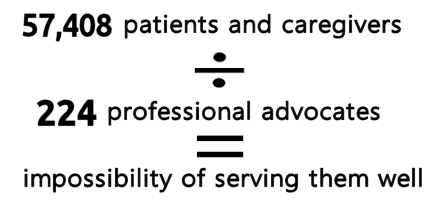You don’t have to be a huge fan of Dr. Phil’s to appreciate his delightful and useful sayings. He boils down important and sometimes complex concepts into downhome philosophy that helps us better understand our fellow human beings and our lives.
Today we’re going to focus on one of those sayings to improve our ability to ferret out those clients we should not work with (yes, I said, SHOULD NOT work with):
“No matter how flat you make your pancake, it still has two sides.”
Advocacy stories are like those pancakes. They have at least two sides, too.
I raise this today after an exchange with an APHA member about a disconcerting client experience. That came on the heels of another advocate’s experience where, because of a simple typo on her directory profile, a potential client posted a negative review of her work.
Say what? Let’s look at both stories – and, in pancake style, their flip sides.
The first advocate was contacted by a potential client who was very specific about help he needed with a hospital bill. After an assessment conversation, she quoted him a price, sent him an electronic invoice, then waited for him to pay it. He forwarded reams of paperwork to her, but never paid the invoice. She sent invoice reminders. He contacted her several times asking why she had not gotten started on the work (indicating there was some deadline that needed to be met), promising a check was on its way, and she reiterated that he needed to pay his invoice before she would get started.
Payment was never forthcoming. She never started the work. He got very upset, and contacted APHA through its feedback process making her out to be the demon-child for not handling the work, and for making him miss a deadline. Of course, he never mentioned the lack of payment.
Now, as you can imagine, this kind of report is quite disturbing! But, understanding that there might be another side to this client-story pancake, and as we do for negative reviews, we contacted the advocate just to make her aware of it. That’s when she told us about his non-payment. Further, it turns out that on a number of occasions, he had been rude and abusive in both email and on the phone. Clearly he was trying to bully her into doing the work without his payment. Wrong, wrong, wrong, and I’m pleased and proud she held her own, despite that bullying.
The second story falls under the category of “things that make you go “huh?”.
In this case, an advocate made a simple typo in the phone number she added to her AdvoConnection Directory profile. One fellow, a potential client, dialed the incorrect number and, of course, got a message saying the number had been disconnected. So he posted a negative review about the advocate’s service. (Seriously!) Those reviews come to us so we can approve them – or not. We forwarded the review to our member and she fixed her phone number immediately, of course.
Now, we’ll point out here that the fellow had many other ways to contact her. Her email address was listed right there, too. A link to her advocacy website was also there (where her correct phone number can be found in any number of places), and there is a form on every advocate’s profile page that allows contact right through the directory profile.
What a vindictive response to something so simple with so many alternatives.
My advice to the advocate? Simply that she had dodged a bad situation. I can’t imagine working with someone like him. That typo might have been a blessing in disguise.
 Yes, unfortunately, and a sentiment that will be echoed by anyone who has worked for any length of time as an advocate, sometimes clients can be impossible to please, abusive, and… yes, snakes. They expect something for nothing, they treat a professional like a child, or worse, like a whipping post. They have unrealistic expectations, and yes, sometimes they lie.
Yes, unfortunately, and a sentiment that will be echoed by anyone who has worked for any length of time as an advocate, sometimes clients can be impossible to please, abusive, and… yes, snakes. They expect something for nothing, they treat a professional like a child, or worse, like a whipping post. They have unrealistic expectations, and yes, sometimes they lie.
[Let me also mention that the client-snakes are the exceptions! We don’t want to scare you off! This is just an acknowledgement that sometimes client behavior is horrible.]
So, back to those unrealistic expectations…
Knowing that on occasion you’ll be contacted by someone you should not work with, we have to ask how you can figure out who they are.
Is there some magic formula that will help you identify the red warning flags, and sort out the potentially good clients from the bad?
Tada! We have some answers and advice for you! Coming up this week, APHA’s Expert Call-in is called Phone Calls with Potential Clients: Screening for Success? APHA member and successful patient advocate AnnMarie McIlwain will share some guidelines she has developed, some “Do’s” and some “Don’ts” for determining possible success from a potential client, and as importantly – which ones to avoid. She’s going to help us identify red flags, and I promise you, some will surprise you.
You’ll need to register to participate in the call. (APHA members only.) If you can’t make the call, the podcast and follow-up resources will be available to APHA members a few days later.
It’s time to figure out when the other side of the pancake is one to avoid. We hope you’ll join us!
LEARN ABOUT APHA MEMBERSHIP | REASONS PATIENTS NEED ADVOCATES | MASTER LIST OF PRACTICE RESOURCES





